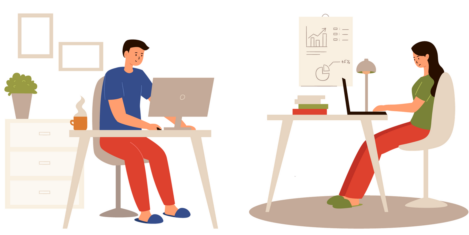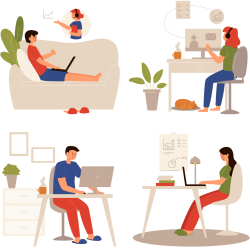April 30, 2021
Search Results for: future of work
April 22, 2021
Business leaders lose touch with remote working employees
by Jayne Smith • Business, Flexible working, News
 EMEA business leaders are out of touch with what employees want in the hybrid workplace experience, and 66 percent of organisations plan to adopt a different operating model than they had before the COVID-19 pandemic, according to a new survey from Unisys Corporation. (more…)
EMEA business leaders are out of touch with what employees want in the hybrid workplace experience, and 66 percent of organisations plan to adopt a different operating model than they had before the COVID-19 pandemic, according to a new survey from Unisys Corporation. (more…)
April 21, 2021
Workers do double the work because of disconnected tech
by Jayne Smith • News, Technology, Working lives
 New research by Templafy claims over a third (37 percent) of UK employees do around double the amount of work because their technology stack lacks useful integrations in its business enablement report. This leaves UK workers spending large amounts of time switching between applications, with over one in four, 27 percent, using six to ten different applications each week. (more…)
New research by Templafy claims over a third (37 percent) of UK employees do around double the amount of work because their technology stack lacks useful integrations in its business enablement report. This leaves UK workers spending large amounts of time switching between applications, with over one in four, 27 percent, using six to ten different applications each week. (more…)
April 21, 2021
Email fatigue is causing rising dissatisfaction with remote work
by Jayne Smith • Flexible working, News, Working lives
 Superhuman, have released the results of a new survey that examines how the pandemic and shift to remote work are impacting employee satisfaction with their jobs. (more…)
Superhuman, have released the results of a new survey that examines how the pandemic and shift to remote work are impacting employee satisfaction with their jobs. (more…)
April 20, 2021
FUTURE Designs awarded the IMMUNE Building Standard
by Freddie Steele • Company news
 FUTURE Designs, a UK based designer and manufacturer of luminaires and lighting solutions, obtains the first IMMUNE Building Standard certification in the world for an Industrial Building, awarded by Healthy by Design Building Institute (HDBI). The factory and headquarters achieved the label ‘IMMUNE – Strong’ following the company’s successful implementation of the health and safety set of measures for its employees. (more…)
FUTURE Designs, a UK based designer and manufacturer of luminaires and lighting solutions, obtains the first IMMUNE Building Standard certification in the world for an Industrial Building, awarded by Healthy by Design Building Institute (HDBI). The factory and headquarters achieved the label ‘IMMUNE – Strong’ following the company’s successful implementation of the health and safety set of measures for its employees. (more…)
April 15, 2021
Finance directors set out plans for truly remote workforces
by Neil Franklin • Flexible working, News, Workplace
 A new global survey by CFO Research and Globalization Partners, claims that 81 percent of the CFOs who responded say their company’s long-term growth strategy includes international expansion, either currently ongoing or in their future plans. The survey also uncovered changing perceptions about hiring and remote work because of their pandemic experiences, with 85 percent of respondents indicating the ability to tap into a more cost-effective, global talent pool that is equipped with the appropriate skills would be desirable. (more…)
A new global survey by CFO Research and Globalization Partners, claims that 81 percent of the CFOs who responded say their company’s long-term growth strategy includes international expansion, either currently ongoing or in their future plans. The survey also uncovered changing perceptions about hiring and remote work because of their pandemic experiences, with 85 percent of respondents indicating the ability to tap into a more cost-effective, global talent pool that is equipped with the appropriate skills would be desirable. (more…)
April 12, 2021
Companies use skills as the new currency for workforce transformation
by Jayne Smith • News, Working culture
 Skills have become the new currency of workforce and talent strategies, as more than half of organisations that responded to the 2021 Mercer Global Talent Trends survey are targeting upskilling and reskilling of critical talent pools to drive workforce transformation. (more…)
Skills have become the new currency of workforce and talent strategies, as more than half of organisations that responded to the 2021 Mercer Global Talent Trends survey are targeting upskilling and reskilling of critical talent pools to drive workforce transformation. (more…)
March 29, 2021
Mental health transparency at the top is the key to workplace wellbeing
by Elaine Carnegie • Comment, Wellbeing
 As the world emerges from the grip of the pandemic, the mental health crisis continues to worsen. One thing is for certain as we look to rebuild – the business community must put the mental health of all employees as top priority. But is there something that’s missing in the current conversation around workplace mental health and wellbeing? One thought is around leaders themselves, and that intrinsic connection to their own mental health and wellbeing. What many leaders have been carrying throughout the pandemic is exceptional, including the added weight of responsibility for the wellbeing and mental health of employees and to create mentally healthy workplaces, yet we rarely hear how leaders themselves are coping. (more…)
As the world emerges from the grip of the pandemic, the mental health crisis continues to worsen. One thing is for certain as we look to rebuild – the business community must put the mental health of all employees as top priority. But is there something that’s missing in the current conversation around workplace mental health and wellbeing? One thought is around leaders themselves, and that intrinsic connection to their own mental health and wellbeing. What many leaders have been carrying throughout the pandemic is exceptional, including the added weight of responsibility for the wellbeing and mental health of employees and to create mentally healthy workplaces, yet we rarely hear how leaders themselves are coping. (more…)
March 26, 2021
Remote working one year on: three-quarters of employees feel worse
by Jayne Smith • Flexible working, News, Wellbeing
 Remote workers are still struggling with distracting working environments, stress and an ‘always-on’ culture after a year of working from home. Egress’ Remote working: one year on report claims that three-quarters of remote workers reported feeling worse as a result of long-term working from home, with almost over one-third (39 percent) feeling more stressed. (more…)
Remote workers are still struggling with distracting working environments, stress and an ‘always-on’ culture after a year of working from home. Egress’ Remote working: one year on report claims that three-quarters of remote workers reported feeling worse as a result of long-term working from home, with almost over one-third (39 percent) feeling more stressed. (more…)
March 26, 2021
Do business leaders trust employees when they work outside the office?
by Jayne Smith • Business, Flexible working, News
 Remote work, rapidly accelerated by the pandemic, is now essential to business success and worker productivity. However, as parts of the world open up and hybrid work becomes a reality, research claims that companies must invest in establishing flexible work policies and programs, and address a sizeable disconnect in trust between decision makers and employees, according to a Forrester study commissioned by LogMeIn, Inc. (more…)
Remote work, rapidly accelerated by the pandemic, is now essential to business success and worker productivity. However, as parts of the world open up and hybrid work becomes a reality, research claims that companies must invest in establishing flexible work policies and programs, and address a sizeable disconnect in trust between decision makers and employees, according to a Forrester study commissioned by LogMeIn, Inc. (more…)




























April 16, 2021
Hybrid working risks becoming a meaningless term
by Ben Gillam • Comment, Flexible working, Workplace design